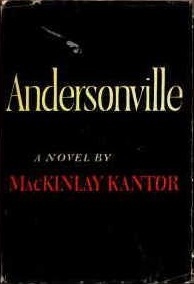Andersonville (novel)

First edition cover
|
|
| Author | MacKinlay Kantor |
|---|---|
| Country | United States |
| Language | English |
| Genre | Historical novel |
| Publisher | Penguin Books |
|
Publication date
|
1955 |
| Media type | Print (Hardback & Paperback) |
| ISBN | 0-452-26956-3 |
Andersonville is a novel by MacKinlay Kantor concerning the Confederate prisoner of war camp, Andersonville prison, during the American Civil War (1861–1865). The novel was originally published in 1955, and won the Pulitzer Prize for Fiction the following year.
Plot summary
The novel interweaves the stories of real and fictional characters. It is told from many points of view, including that of Henry Wirz, the camp commandant, who was later executed. It also features William Collins, a Union soldier and one of the leaders of the "Raiders". The "Raiders" are a gang of thugs, mainly bounty jumpers who steal from their fellow prisoners and lead comfortable lives while other prisoners die of starvation and disease. Other characters include numerous ordinary prisoners of war, the camp physician/doctor, a nearby plantation owner, guards and Confederate civilians in the area near the prison.
Andersonville is clearly based on prisoner memoirs, most notably Andersonville: A Story of Rebel Military Prisons by John McElroy. Henry Wirz, who received an injury earlier in the war and never recovered properly, is portrayed not as an inhuman fiend but as a sick man struggling with a job beyond his capacities.
Kantor's novel was not the basis for a 1996 John Frankenheimer film Andersonville. Although Kantor did sell the motion picture rights of his novel to one of the major Hollywood studios in the 1950s, it was never produced. Kantor's novel and the movie of the same name are two separate properties.
Characters in Andersonville
Historical figures who appear as characters in the novel include:
- Henry Wirz (Confederate, camp commandant)
- John McElroy (Union prisoner, future memoir writer)
- William Collins (Union prisoner, "Raider" leader executed by fellow prisoners)
- Boston Corbett (Union prisoner, future killer of John Wilkes Booth)
- John Winder (Confederate general in charge of prisoners-of-war)
- John L. Ransom (1843-1919) (Union prisoner), a printer from Jackson, Michigan, who kept a detailed diary of his capture, imprisonment, and escape. This was published as Andersonville Diary.
- Robert Hall Chilton (Confederate Inspector General in Richmond who received reports from Field Surgeons, and consequently wondered, in print, about the judgment of history if the abominations at Andersonville remained uncorrected.
Bibliography
Commager, Henry Steele. "The Last Full Measure of Devotion: A Novel of an Infamous Prison in the Civil War" The New York Times Book Review. Oct. 30, 1955. VII, p. 1.
Cullen, Jim. The Civil War in Popular Culture. Smithsonian Institution Press, Washington: 1995.
Hesseltine, William B. "Andersonville Revisited." The Georgia Review., 1956, p 92-100.
Kantor, Mackinlay. "The Last Full Measure of Devotion: The Author Tells How He Relived the Tragedy" The New York Times Book Review. Oct. 30, 1955. VII, p. 1.
Kantor, Mackinlay, Andersonville. Penguin Books USA, Inc., New York : 1955.
Poore, Charles. "Andersonville (Review)." The New York Times. Oct. 27, 1955, p. 31:4.
Stuckey, W. J. The Pulitzer Prize Novels : A Critical Backward Look. University of Oklahoma Press, Norman: 1981.